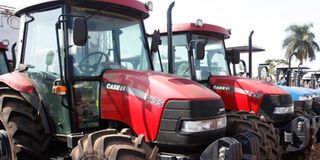How agriculture can boost new car sales

Because of low levels of agricultural investment in Uganda, sales of new vehicles such as tractors are low compared to Kenya. PHOTO BY RACHEL MABALA.
What you need to know:
Uganda’s vehicle market is mainly dominated by pre-used units, taking up the large share of Uganda’s motor vehicle sales. Herman Mbalasi, the Cooper Motors Corporation country manager, told Jonathan Adengo why sales are generally skewed towards pre-used cars.
What is the percentage market of new cars on the Ugandan market?
On average the new motor vehicle segment sells about 2,500 units a year which translates into about 5 per cent of total market share. Sales of new cars are indeed low when compared to pre-used vehicles which have a 95 per cent market share per annum.
How does this affect people who sell new cars?
It is tricky for us. We are fighting for a very small market. However, we have been encouraged by the current trends. It seems customers are beginning to realise the importance of new cars, which if compared with pre-used ones are more durable and comfortable.
But people say new cars are expensive....
It is true new cars are expensive but there is a saying that cheap is expensive. Unlike pre-used vehicles, new vehicles have a lot of advantages including guaranteed repairs and after sales services. Additionally you can take over a year without replacing any parts.
Are there any specific packages through which people can own new vehicles?
When a person decides to buy a vehicle a decision must have been reached. So coming to procure a unit you have to count the cost but we give you advice in regard to your proposal. If you are an employee some dealers will align you with a bank that can buy for you the vehicle as you pay back in agreed installments. But other dealers might require that you have a 50 per cent deposit and agree on how you can pay the balance. So there are packages but they vary with dealers.
How are trends in terms of sales?
Sales trends are determined by a number of factors. For instance you may have a scenario like now where political campaigns are going on. Around this time, until up to around April we seem to have laurels in the market with most customers waiting to see the events in the market. Therefore, you might find that few or more units are sold due to the presence of a certain condition in the market.
How would you compare the market in Uganda and that of Kenya?
Agriculture in Kenya is giving new car sales some numbers. For instance in Kenya agriculture is quite enormous and mechanised. So you will find even individual customers buying tractors for their work. This is not the case with Uganda.
However, I think in Uganda there is potential that has not been harnessed, especially because of low investment in agriculture. Secondly the tax policy, which stops the entry of pre-used vehicles that are older than seven years encourages purchase of new vehicles. However, with the introduction of a new tax policy in Uganda we could begin seeing some results but that can only happen after two years when the current stock of pre-used vehicles is finished.
The economy has had challenges, especially with the depreciation of the Shilling. Have you had any challenges in that regard?
Yes we have had some challenges. The uncertainty in terms of currency stability is very challenging because the Shilling which was at about Shs2,700 has moved to Shs3,660. You can imagine that hiccup. So we have had to change with market trends, which could be undesirable for our customers. Otherwise the market now demands that we do what is best for us and the market to stay afloat.
What is your projection for the five years?
We are seeing potential and we indeed want to grow our market. This shall be done opening new facilities, especially in faraway markets like Mbarara, Mbale and Gulu. Dealers should also look at improving after sales services as well as marketing their products and letting people to know the importance of using new cars.




